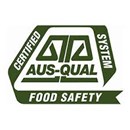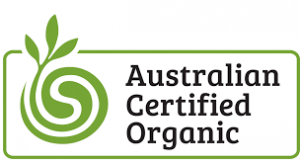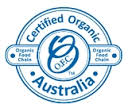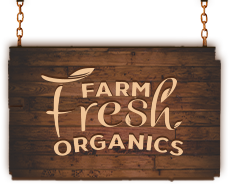Organic Certification
How can you be sure that the produce you buy from Farm Fresh Organics is really organic?
Quite simply because our farm is certified organic and we only purchase certified organic
produce from farmers who’ve been carefully inspected by one of the national independent
certification bodies in Australia, as follows:

Aus – Qual is a relatively new Certifier of Organic Produce and products based in QLD.

Australian Certified Organic is the largest certifier of organic produce and the most recognised by consumers. This logo can only appear on products that meet the strict organic standard and are audited annually to check compliance. While audits are scheduled, 5% of audits are unscheduled, so can occur at any time.

The second oldest and second largest is the National Association for Sustainable Agriculture, Australia Ltd. NASSA certifies produce as organic or biodynamic. Labels indicate products are either ‘certified organic’ or ‘certified conversion’.

The oldest Certification organisation in Australia is the Biodynamic research institute, which administers the Demeter standard. This organisation only certifies biodynamic produce.

The Organic Food Chain is the most recent certification organisation to begin operating in Australia.

The Organic Growers of Austrlaia certification system was designed to be ethical, cost-effective, and charge no levies on organic sales.
Our farm, Blueberry Hill, on Tamborine Mountain is certified organic with OGA (#12112).

The Tasmanian organic-dynamic producers cooperative (top) certifies organic and biodynamic food grown or made in Tasmania
So how does it work?
Through the use of printed standards, on-site inspection and multi-stage review of their application, organic producers seek to verify that their farming or processing facility and system meet the generally agreed standards for organic production. As a family we like the fact that Certified Organic Food production is transparent and has a clear audit trail from our shelves here at Farm Fresh Organics to the exact farm of origin.
While each Certification body has slightly different standards and procedures, they all meet minimum National Standards for organically produced products.
This standard is at the ground level the Farmers responsibility
Then the Certifiers to make sure that the Farmers maintain their Organic principles whilst overseeing both organic wholesalers and retailers.
The Organic Federation of Australia (OFA) is the peak industry body who over sees the Certifying bodies in Australia.
The Australian Quarantine Inspection Service (AQIS) is the Government body that officially oversees the entire Organic Industry in Australia with special recommendations where appropriate for involvement of government legislation relating to ACCC and The Department of Fair Trade.
The global Organic Market is overseen by the International Federation of Organic Agriculture Movements (IFOAM) which certifies the Certifiers of each country if they wish to meet the stringent standards of the international Organic market.
In Australia the Organic Certification system was set up in the 80’s to ensure that what was claimed to be ‘organic’, was ‘really organic’. In Australia we have 8 Certification bodies (see Certifications), each with a unique logo specific to that organisation for easy recognition of Certified Organic product in the market place.
This organized trail ensures that the goods we purchase on your behalf meet the most stringent of standards. We have also traveled to many of our Farmers properties around Australia to know the people who grow the produce we sell to you. Obviously when buying Certified Organic fresh produce you must trust the people you buy from. 9 times out of 10 when buying fresh, as with farm Fresh organics, you do not see the box in which your produce has arrived. This box proudly displays the Farmers Certification details as proof of purchase. We welcome all enquiry’s into the produce we home deliver for you.
Levels of Organic Certification
Getting a farm certified organic takes 3 years.
Year 1 – ‘under supervision’ – all inputs for the previous three years must be recorded, all inputs and exports for this year must be recorded; produce cannot be sold as organic.
Years 2&3 – ‘in conversion’ – In Conversion to Organic is a period where the farmer is recognized organically and able to sell his or her produce as Certified Organic, although the fruit and veg must be labeled ‘in conversion’. During this period the farmer is developing their systems under the supervision of their chosen Certification body.
Year 4 onwards – ‘Certified Organic’ is the highest level of Certification a farmer can reach. Farmers selling produce as ‘Certified Organic’ are experienced, extremely capable and have certainly had many years growing organic produce.
When buying Certified Organic Produce – especially at Farmers Markets – if you are not sure that the produce is Certified Organic ask the Farmer to show you their Certification registration. Organic Farmers who hold certification are very proud of the fact, and they will be delighted to demonstrate the authenticity of their product. Similarly in an Organic Shop, if you are uncertain of the status of a particular item, ask a staff member. A Certified Retail Outlet will be only too happy to provide you with the information you require. At Farm Fresh Organics we welcome any questions you may have in regards to our Farmers, our practices and/or the produce we have available.
